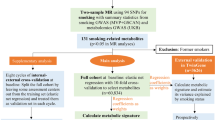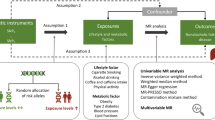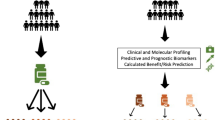Abstract
Aim
This study aimed to explore the causal association between inflammatory bowel disease (IBD) and the risk of type 2 diabetes (T2D) based on a two-sample Mendelian randomization (MR) study.
Methods
Summary single nucleotide polymorphism (SNP)-phenotype association data were obtained from published two genome-wide association studies (GWAS) including SNPs related to IBD, UC, or CD in European participants (n = 71,997) and East Asian participants (n = 16,805). Two GWAS including SNPs associated with T2D included 655,666 Europeans and 433,540 East Asians. A series of screening processes were performed to select qualified instrumental SNPs strongly related to exposure. We applied the inverse variance weighted (IVW), the MR-Egger regression, and the weighted median to estimate the causal effects of IBD, ulcerative colitis (UC) or Crohn’ disease (CD) on T2D. Cochran’s Q test was conducted to evaluate the statistical heterogeneity between SNPs in the IVW method. The leave-one-out analysis was employed to assess whether the results were caused by any single SNP associated with IBD, UC, or CD. Odds ratio (OR) and 95% confidence interval (CI) were calculated.
Results
The IVW results demonstrated that IBD could increase the risk of T2D in the European population (OR = 1.0230, 95%CI: 1.0073–1.0390). UC was positively associated with the risk of T2D according to the weighted median (OR = 1.0274, 95%CI: 1.0009–1.0546) and IVW (OR = 1.0244, 95%CI: 1.0071–1.0421) results in the European population. The IVW results indicated that the CD was positively associated with the risk of T2D in the European population (OR = 1.0187, 95%CI: 1.0045–1.0330). In the East Asian population, there are no associations between the IBD, UC, or CD and the risk of T2D (all P > 0.05). MVMR results revealed that the causal effect UC on T2D was still statistically significant after including body mass index (BMI) or low-density lipoprotein (LDL).
Conclusion
IBD, UC, or CD had causal effects on the risk of T2D in the European population, which might provide evidence for the prevention of T2D in patients with IBD, UC, or CD.


Similar content being viewed by others
Data availability
The datasets generated and/or analyzed during the current study are available in the GWASs, https://gwas.mrcieu.ac.uk/datasets/.
References
Aniwan S, Santiago P, Loftus EV Jr, Park SH (2022) The epidemiology of inflammatory bowel disease in Asia and Asian immigrants to Western countries. United Eur Gastroenterol J 10(10):1063–1076. https://doi.org/10.1002/ueg2.12350
Hirata Y, Ihara S, Koike K (2016) Targeting the complex interactions between microbiota, host epithelial and immune cells in inflammatory bowel disease. Pharmacol Res 113(Pt A):574–584. https://doi.org/10.1016/j.phrs.2016.09.044
Holst JJ, Gribble F, Horowitz M, Rayner CK (2016) Roles of the gut in glucose homeostasis. Diabetes Care 39(6):884–892. https://doi.org/10.2337/dc16-0351
Tigas S, Tsatsoulis A (2012) Endocrine and metabolic manifestations in inflammatory bowel disease. Ann Gastroenterol 25(1):37–44
Jess T, Jensen BW, Andersson M, Villumsen M, Allin KH (2020) Inflammatory bowel diseases increase risk of type 2 Diabetes in a Nationwide Cohort Study. Clin Gastroenterol Hepatol 18(4):881-888.e881. https://doi.org/10.1016/j.cgh.2019.07.052
Kang EA, Han K, Chun J, Soh H, Park S, Im JP, Kim JS (2019) Increased risk of diabetes in inflammatory bowel disease patients: a nationwide population-based study in Korea. J Clin Med. https://doi.org/10.3390/jcm8030343
Lai SW, Kuo YH, Liao KF (2020) Association between inflammatory bowel disease and diabetes mellitus. Clin Gastroenterol Hepatol 8(4):1002–1003. https://doi.org/10.1016/j.cgh.2019.09.016
Davey Smith G, Hemani G (2014) Mendelian randomization: genetic anchors for causal inference in epidemiological studies. Hum Mol Genet 23(R1):R89-98. https://doi.org/10.1093/hmg/ddu328
Carter P, Yuan S, Kar S, Vithayathil M, Mason AM, Burgess S, Larsson SC (2022) Coffee consumption and cancer risk: a Mendelian randomisation study. Clin Nutr (Edinburgh, Scotland) 41(10):2113–2123. https://doi.org/10.1016/j.clnu.2022.08.019
Zhang J, Chen Z, Pärna K, van Zon SKR, Snieder H, Thio CHL (2022) Mediators of the association between educational attainment and type 2 diabetes mellitus: a two-step multivariable Mendelian randomisation study. Diabetologia 65(8):1364–1374. https://doi.org/10.1007/s00125-022-05705-6
Hartley A, Sanderson E, Granell R, Paternoster L, Zheng J, Smith GD, Southam L, Hatzikotoulas K, Boer CG, van Meurs J, Zeggini E, Gregson CL, Tobias JH (2022) Using multivariable Mendelian randomization to estimate the causal effect of bone mineral density on osteoarthritis risk, independently of body mass index. Int J Epidemiol 51(4):1254–1267. https://doi.org/10.1093/ije/dyab251
Jostins L, Ripke S, Weersma RK, Duerr RH, McGovern DP, Hui KY, Lee JC, Schumm LP, Sharma Y, Anderson CA, Essers J, Mitrovic M, Ning K, Cleynen I, Theatre E, Spain SL, Raychaudhuri S, Goyette P, Wei Z, Abraham C, Achkar JP, Ahmad T, Amininejad L, Ananthakrishnan AN, Andersen V, Andrews JM, Baidoo L, Balschun T, Bampton PA, Bitton A, Boucher G, Brand S, Büning C, Cohain A, Cichon S, D’Amato M, De Jong D, Devaney KL, Dubinsky M, Edwards C, Ellinghaus D, Ferguson LR, Franchimont D, Fransen K, Gearry R, Georges M, Gieger C, Glas J, Haritunians T, Hart A, Hawkey C, Hedl M, Hu X, Karlsen TH, Kupcinskas L, Kugathasan S, Latiano A, Laukens D, Lawrance IC, Lees CW, Louis E, Mahy G, Mansfield J, Morgan AR, Mowat C, Newman W, Palmieri O, Ponsioen CY, Potocnik U, Prescott NJ, Regueiro M, Rotter JI, Russell RK, Sanderson JD, Sans M, Satsangi J, Schreiber S, Simms LA, Sventoraityte J, Targan SR, Taylor KD, Tremelling M, Verspaget HW, De Vos M, Wijmenga C, Wilson DC, Winkelmann J, Xavier RJ, Zeissig S, Zhang B, Zhang CK, Zhao H, Silverberg MS, Annese V, Hakonarson H, Brant SR, Radford-Smith G, Mathew CG, Rioux JD, Schadt EE, Daly MJ, Franke A, Parkes M, Vermeire S, Barrett JC, Cho JH (2012) Host-microbe interactions have shaped the genetic architecture of inflammatory bowel disease. Nature 491(7422):119–124. https://doi.org/10.1038/nature11582
Liu JZ, van Sommeren S, Huang H, Ng SC, Alberts R, Takahashi A, Ripke S, Lee JC, Jostins L, Shah T, Abedian S, Cheon JH, Cho J, Dayani NE, Franke L, Fuyuno Y, Hart A, Juyal RC, Juyal G, Kim WH, Morris AP, Poustchi H, Newman WG, Midha V, Orchard TR, Vahedi H, Sood A, Sung JY, Malekzadeh R, Westra HJ, Yamazaki K, Yang SK, Barrett JC, Alizadeh BZ, Parkes M, Bk T, Daly MJ, Kubo M, Anderson CA, Weersma RK (2015) Association analyses identify 38 susceptibility loci for inflammatory bowel disease and highlight shared genetic risk across populations. Nat Genet 47(9):979–986. https://doi.org/10.1038/ng.3359
Xue A, Wu Y, Zhu Z, Zhang F, Kemper KE, Zheng Z, Yengo L, Lloyd-Jones LR, Sidorenko J, Wu Y, McRae AF, Visscher PM, Zeng J, Yang J (2018) Genome-wide association analyses identify 143 risk variants and putative regulatory mechanisms for type 2 diabetes. Nat Commun 9(1):2941. https://doi.org/10.1038/s41467-018-04951-w
Spracklen CN, Horikoshi M, Kim YJ, Lin K, Bragg F, Moon S, Suzuki K, Tam CHT, Tabara Y, Kwak SH, Takeuchi F, Long J, Lim VJY, Chai JF, Chen CH, Nakatochi M, Yao J, Choi HS, Iyengar AK, Perrin HJ, Brotman SM, van de Bunt M, Gloyn AL, Below JE, Boehnke M, Bowden DW, Chambers JC, Mahajan A, McCarthy MI, Ng MCY, Petty LE, Zhang W, Morris AP, Adair LS, Akiyama M, Bian Z, Chan JCN, Chang LC, Chee ML, Chen YI, Chen YT, Chen Z, Chuang LM, Du S, Gordon-Larsen P, Gross M, Guo X, Guo Y, Han S, Howard AG, Huang W, Hung YJ, Hwang MY, Hwu CM, Ichihara S, Isono M, Jang HM, Jiang G, Jonas JB, Kamatani Y, Katsuya T, Kawaguchi T, Khor CC, Kohara K, Lee MS, Lee NR, Li L, Liu J, Luk AO, Lv J, Okada Y, Pereira MA, Sabanayagam C, Shi J, Shin DM, So WY, Takahashi A, Tomlinson B, Tsai FJ, van Dam RM, Xiang YB, Yamamoto K, Yamauchi T, Yoon K, Yu C, Yuan JM, Zhang L, Zheng W, Igase M, Cho YS, Rotter JI, Wang YX, Sheu WHH, Yokota M, Wu JY, Cheng CY, Wong TY, Shu XO, Kato N, Park KS, Tai ES, Matsuda F, Koh WP, Ma RCW, Maeda S, Millwood IY, Lee J, Kadowaki T, Walters RG, Kim BJ, Mohlke KL, Sim X (2020) Identification of type 2 diabetes loci in 433,540 East Asian individuals. Nature 582(7811):240–245. https://doi.org/10.1038/s41586-020-2263-3
Hoffmann TJ, Choquet H, Yin J, Banda Y, Kvale MN, Glymour M, Schaefer C, Risch N, Jorgenson E (2018) A large multiethnic genome-wide association study of adult body mass index identifies novel Loci. Genetics 210(2):499–515. https://doi.org/10.1534/genetics.118.301479
Willer CJ, Schmidt EM, Sengupta S, Peloso GM, Gustafsson S, Kanoni S, Ganna A, Chen J, Buchkovich ML, Mora S, Beckmann JS, Bragg-Gresham JL, Chang HY, Demirkan A, Den Hertog HM, Do R, Donnelly LA, Ehret GB, Esko T, Feitosa MF, Ferreira T, Fischer K, Fontanillas P, Fraser RM, Freitag DF, Gurdasani D, Heikkilä K, Hyppönen E, Isaacs A, Jackson AU, Johansson Å, Johnson T, Kaakinen M, Kettunen J, Kleber ME, Li X, Luan J, Lyytikäinen LP, Magnusson PKE, Mangino M, Mihailov E, Montasser ME, Müller-Nurasyid M, Nolte IM, O'Connell JR, Palmer CD, Perola M, Petersen AK, Sanna S, Saxena R, Service SK, Shah S, Shungin D, Sidore C, Song C, Strawbridge RJ, Surakka I, Tanaka T, Teslovich TM, Thorleifsson G, Van den Herik EG, Voight BF, Volcik KA, Waite LL, Wong A, Wu Y, Zhang W, Absher D, Asiki G, Barroso I, Been LF, Bolton JL, Bonnycastle LL, Brambilla P, Burnett MS, Cesana G, Dimitriou M, Doney ASF, Döring A, Elliott P, Epstein SE, Ingi Eyjolfsson G, Gigante B, Goodarzi MO, Grallert H, Gravito ML, Groves CJ, Hallmans G, Hartikainen AL, Hayward C, Hernandez D, Hicks AA, Holm H, Hung YJ, Illig T, Jones MR, Kaleebu P, Kastelein JJP, Khaw KT, Kim E, Klopp N, Komulainen P, Kumari M, Langenberg C, Lehtimäki T, Lin SY, Lindström J, Loos RJF, Mach F, McArdle WL, Meisinger C, Mitchell BD, Müller G, Nagaraja R, Narisu N, Nieminen TVM, Nsubuga RN, Olafsson I, Ong KK, Palotie A, Papamarkou T, Pomilla C, Pouta A, Rader DJ, Reilly MP, Ridker PM, Rivadeneira F, Rudan I, Ruokonen A, Samani N, Scharnagl H, Seeley J, Silander K, Stančáková A, Stirrups K, Swift AJ, Tiret L, Uitterlinden AG, van Pelt LJ, Vedantam S, Wainwright N, Wijmenga C, Wild SH, Willemsen G, Wilsgaard T, Wilson JF, Young EH, Zhao JH, Adair LS, Arveiler D, Assimes TL, Bandinelli S, Bennett F, Bochud M, Boehm BO, Boomsma DI, Borecki IB, Bornstein SR, Bovet P, Burnier M, Campbell H, Chakravarti A, Chambers JC, Chen YI, Collins FS, Cooper RS, Danesh J, Dedoussis G, de Faire U, Feranil AB, Ferrières J, Ferrucci L, Freimer NB, Gieger C, Groop LC, Gudnason V, Gyllensten U, Hamsten A, Harris TB, Hingorani A, Hirschhorn JN, Hofman A, Hovingh GK, Hsiung CA, Humphries SE, Hunt SC, Hveem K, Iribarren C, Järvelin MR, Jula A, Kähönen M, Kaprio J, Kesäniemi A, Kivimaki M, Kooner JS, Koudstaal PJ, Krauss RM, Kuh D, Kuusisto J, Kyvik KO, Laakso M, Lakka TA, Lind L, Lindgren CM, Martin NG, März W, McCarthy MI, McKenzie CA, Meneton P, Metspalu A, Moilanen L, Morris AD, Munroe PB, Njølstad I, Pedersen NL, Power C, Pramstaller PP, Price JF, Psaty BM, Quertermous T, Rauramaa R, Saleheen D, Salomaa V, Sanghera DK, Saramies J, Schwarz PEH, Sheu WH, Shuldiner AR, Siegbahn A, Spector TD, Stefansson K, Strachan DP, Tayo BO, Tremoli E, Tuomilehto J, Uusitupa M, van Duijn CM, Vollenweider P, Wallentin L, Wareham NJ, Whitfield JB, Wolffenbuttel BHR, Ordovas JM, Boerwinkle E, Palmer CNA, Thorsteinsdottir U, Chasman DI, Rotter JI, Franks PW, Ripatti S, Cupples LA, Sandhu MS, Rich SS, Boehnke M, Deloukas P, Kathiresan S, Mohlke KL, Ingelsson E, Abecasis GR (2013) Discovery and refinement of loci associated with lipid levels. Nat Genet 45 (11):1274–1283. https://doi.org/10.1038/ng.2797
Zheng H, Shi YZ, Liang JT, Lu LL, Chen M (2023) Modifiable factors for migraine prophylaxis: a mendelian randomization analysis. Front Pharmacol 14:1010996. https://doi.org/10.3389/fphar.2023.1010996
Sudlow C, Gallacher J, Allen N, Beral V, Burton P, Danesh J, Downey P, Elliott P, Green J, Landray M, Liu B, Matthews P, Ong G, Pell J, Silman A, Young A, Sprosen T, Peakman T, Collins R (2015) UK biobank: an open access resource for identifying the causes of a wide range of complex diseases of middle and old age. PLoS Med 12(3):e1001779. https://doi.org/10.1371/journal.pmed.1001779
Bowden J, Davey Smith G, Burgess S (2015) Mendelian randomization with invalid instruments: effect estimation and bias detection through Egger regression. Int J Epidemiol 44(2):512–525. https://doi.org/10.1093/ije/dyv080
Luo Q, Chen J, Qin L, Luo Y, Zhang Y, Yang X, Wang H (2022) Psoriasis may increase the risk of lung cancer: a two-sample Mendelian randomization study. J Eur Acad Dermatol Venereol: JEADV 36(11):2113–2119. https://doi.org/10.1111/jdv.18437
Burgess S, Thompson SG (2017) Interpreting findings from Mendelian randomization using the MR-Egger method. Eur J Epidemiol 32(5):377–389. https://doi.org/10.1007/s10654-017-0255-x
Bowden J, Davey Smith G, Haycock PC, Burgess S (2016) Consistent estimation in Mendelian randomization with some invalid instruments using a weighted median estimator. Genet Epidemiol 40(4):304–314. https://doi.org/10.1002/gepi.21965
Noordam R, Smit RA, Postmus I, Trompet S, van Heemst D (2016) Assessment of causality between serum gamma-glutamyltransferase and type 2 diabetes mellitus using publicly available data: a Mendelian randomization study. Int J Epidemiol 45(6):1953–1960. https://doi.org/10.1093/ije/dyw306
Dregan A, Charlton J, Chowienczyk P, Gulliford MC (2014) Chronic inflammatory disorders and risk of type 2 diabetes mellitus, coronary heart disease, and stroke: a population-based cohort study. Circulation 130(10):837–844. https://doi.org/10.1161/circulationaha.114.009990
Wu J, Mackie SL, Pujades-Rodriguez M (2020) Glucocorticoid dose-dependent risk of type 2 diabetes in six immune-mediated inflammatory diseases: a population-based cohort analysis. BMJ Open Diabetes Res Care. https://doi.org/10.1136/bmjdrc-2020-001220
Lees CW, Barrett JC, Parkes M, Satsangi J (2011) New IBD genetics: common pathways with other diseases. Gut 60(12):1739–1753. https://doi.org/10.1136/gut.2009.199679
Crowson CS, Liao KP, Davis JM 3rd, Solomon DH, Matteson EL, Knutson KL, Hlatky MA, Gabriel SE (2013) Rheumatoid arthritis and cardiovascular disease. Am Heart J 166(4):622-628.e621. https://doi.org/10.1016/j.ahj.2013.07.010
Corrado E, Rizzo M, Coppola G, Fattouch K, Novo G, Marturana I, Ferrara F, Novo S (2010) An update on the role of markers of inflammation in atherosclerosis. J Atheroscler Thromb 17(1):1–11. https://doi.org/10.5551/jat.2600
Baumgart DC, Sandborn WJ (2012) Crohn’s disease. Lancet (London, England) 380(9853):1590–1605. https://doi.org/10.1016/s0140-6736(12)60026-9
Danese S, Fiocchi C (2011) Ulcerative colitis. N Engl J Med 365(18):1713–1725. https://doi.org/10.1056/NEJMra1102942
Mortensen K, Christensen LL, Holst JJ, Orskov C (2003) GLP-1 and GIP are colocalized in a subset of endocrine cells in the small intestine. Regul Pept 114(2–3):189–196. https://doi.org/10.1016/s0167-0115(03)00125-3
Bagger JI, Knop FK, Lund A, Vestergaard H, Holst JJ, Vilsbøll T (2011) Impaired regulation of the incretin effect in patients with type 2 diabetes. J Clin Endocrinol Metab 96(3):737–745. https://doi.org/10.1210/jc.2010-2435
Jiang J, Wang H, Liu K, He S, Li Z, Yuan Y, Yu K, Long P, Wang J, Diao T, Zhang X, He M, Guo H, Wu T (2023) Association of Complement C3 With Incident Type 2 Diabetes and the Mediating Role of BMI: a 10-Year Follow-Up Study. J Clin Endocrinol Metab 108(3):736–744. https://doi.org/10.1210/clinem/dgac586
Zhu Z, Wang K, Hao X, Chen L, Liu Z, Wang C (2022) Causal graph among serum lipids and glycemic traits: a mendelian randomization study. Diabetes 71(8):1818–1826. https://doi.org/10.2337/db21-0734
Acknowledgements
Not applicable.
Funding
Not applicable.
Author information
Authors and Affiliations
Contributions
YN and YW designed the study. YN wrote the manuscript. QZ collected, analyzed, and interpreted the data. YW critically reviewed, edited, and approved the manuscript. All authors read and approved the final manuscript.
Corresponding author
Ethics declarations
Conflict of interest
The authors declare that they have no competing interests.
Ethical approval
The requirement of ethical approval for this was waived by the Institutional Review Board of Lianyungang Hospital of Traditional Chinese Medicine, because the data were accessed from GWAS (a publicly available database).
Informed consent
The need for written informed consent was waived by the Institutional Review Board of Lianyungang Hospital of Traditional Chinese Medicine due to retrospective nature of the study.
Additional information
Managed By Massimo Porta.
Publisher's Note
Springer Nature remains neutral with regard to jurisdictional claims in published maps and institutional affiliations.
Supplementary Information
Below is the link to the electronic supplementary material.
Rights and permissions
Springer Nature or its licensor (e.g. a society or other partner) holds exclusive rights to this article under a publishing agreement with the author(s) or other rightsholder(s); author self-archiving of the accepted manuscript version of this article is solely governed by the terms of such publishing agreement and applicable law.
About this article
Cite this article
Niu, Y., Zhang, Q. & Wei, Y. Causal effects of inflammatory bowel disease on risk of type 2 diabetes: a two-sample multivariable Mendelian randomization study. Acta Diabetol (2024). https://doi.org/10.1007/s00592-024-02254-9
Received:
Accepted:
Published:
DOI: https://doi.org/10.1007/s00592-024-02254-9




